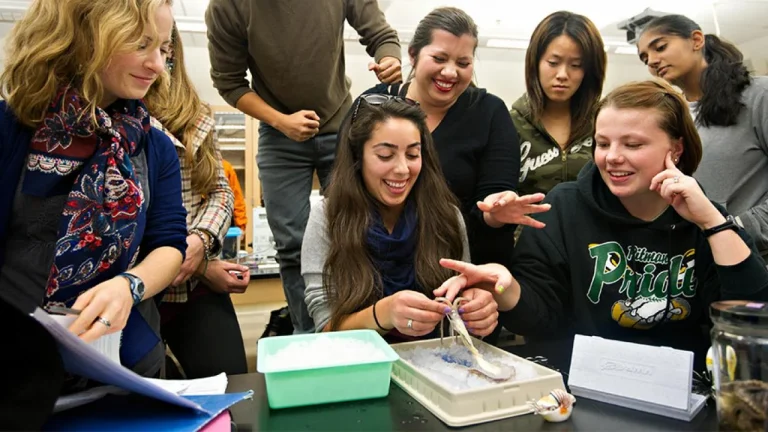Should I Take Ap Environmental Science?
With climate change and environmental issues making headlines daily, interest in environmental science courses like AP Environmental Science is surging. If you want to play a part in solving these critical problems or simply want to learn more about how natural systems work, AP Environmental Science is an excellent choice.
If you’re short on time, here’s a quick answer to your question: Taking AP Environmental Science can benefit students interested in environmental issues or science careers by providing a college-level overview of key topics and scientific study skills.
However, it does require significant time commitment.
In this comprehensive guide, we’ll cover everything you need to consider when deciding whether AP Environmental Science is right for you. We’ll look at the course curriculum and format, skills you’ll build, and benefits for college and future careers.
With the insights below, you’ll be able to make an informed choice about taking this rewarding AP course.
AP Environmental Science Course Overview
Considering taking AP Environmental Science? Here’s a comprehensive overview of the course to help you make an informed decision.
Course curriculum and format
The AP Environmental Science course is designed to provide students with a deep understanding of the interrelationships between humans and the natural world. The curriculum covers a wide range of topics, including ecology, biodiversity, pollution, climate change, and sustainability.
Students will engage in a variety of activities, both in and out of the classroom, to enhance their learning experience. This may include conducting experiments, analyzing data, participating in discussions, and completing hands-on projects.
The course is typically structured as a combination of lectures, group activities, and individual assignments. Students are also expected to actively participate in class discussions and contribute to collaborative projects.
Key topics covered
The AP Environmental Science course delves into several key topics that are crucial for understanding the environmental challenges we face today. These topics include:
- Ecological principles and systems
- Energy flow and nutrient cycling
- Land and water resources
- Air pollution and climate change
- Biodiversity and conservation
- Sustainability and human impacts
By studying these topics, students will develop a comprehensive understanding of the complex issues affecting our planet and gain the knowledge and skills necessary to address them.
Hands-on learning
One of the unique aspects of AP Environmental Science is the emphasis on hands-on learning. Students will have the opportunity to engage in fieldwork, conduct experiments, and analyze real-world data.
Field trips to local ecosystems, such as forests, wetlands, or coastal areas, are often incorporated into the course. These field experiences allow students to directly observe and study environmental processes and interactions.
Additionally, students may be involved in data collection and analysis using various scientific tools and techniques. This hands-on approach not only enhances their understanding of environmental science but also develops critical thinking and problem-solving skills.
Benefits of Taking AP Environmental Science
Gain advanced knowledge in environmental science
Taking AP Environmental Science allows students to delve deeper into the study of the environment. The course covers a wide range of topics, including ecology, biodiversity, pollution, and climate change.
By taking this course, students will gain a comprehensive understanding of the complexities and challenges facing our planet. They will learn about the interconnections between different ecosystems and the impact of human activities on the environment.
According to a study conducted by the College Board, students who took AP Environmental Science were more likely to pursue careers in environmental science and related fields. This shows that the course not only provides knowledge but also ignites a passion for environmental stewardship.
Develop valuable skills
AP Environmental Science not only provides students with knowledge but also helps them develop important skills that are applicable in various areas of life. Critical thinking and problem-solving skills are emphasized throughout the course as students analyze environmental issues and propose solutions.
They also learn how to effectively communicate scientific ideas and data, both in writing and through presentations.
Furthermore, the course encourages students to develop their research skills by conducting experiments and investigations. This hands-on approach allows students to apply the scientific method and collect data to support their findings.
These skills are transferable and can benefit students in their future academic and professional endeavors.
Earn college credit with a qualifying exam score
One of the major benefits of taking AP Environmental Science is the opportunity to earn college credit. With a qualifying score on the AP exam, students can potentially skip introductory-level college courses and move directly into more advanced coursework.
This can save both time and money, as students can graduate earlier and reduce their tuition expenses.
According to a report by the College Board, over 90% of colleges and universities in the United States offer credit, advanced placement, or both for qualifying AP Exam scores. This means that students who perform well on the AP Environmental Science exam have the chance to earn college credit at most institutions.
Is AP Environmental Science a Good Fit For You?
You’re interested in environmental issues
If you have a genuine interest in environmental issues, taking AP Environmental Science can be a great way to further explore this passion. This course covers a wide range of topics including ecology, biodiversity, pollution, and sustainability.
You’ll have the opportunity to delve deep into the complexities of environmental problems and learn about potential solutions. By taking AP Environmental Science, you’ll not only gain knowledge but also develop a better understanding of the impact of human activities on the environment.
You enjoy science classes
If you find science classes fascinating and enjoy the process of experimentation and analysis, then AP Environmental Science may be a perfect fit for you. This course combines elements of biology, chemistry, physics, and geology to provide a comprehensive understanding of environmental systems.
You’ll have the chance to conduct experiments, collect data, and analyze results to draw meaningful conclusions. Additionally, AP Environmental Science encourages critical thinking and problem-solving skills, which are valuable in any scientific discipline.
You have time to commit to challenging coursework
It’s important to consider your current workload and commitments before deciding to take AP Environmental Science. This course is rigorous and requires a significant time commitment. You’ll be expected to complete readings, participate in class discussions, conduct experiments, and complete assignments.
If you have a busy schedule with other demanding courses or extracurricular activities, you may want to carefully evaluate if you have the time and energy to dedicate to this challenging coursework.
Tips for Success in AP Environmental Science
Complete required labs and hands-on activities
One of the key components of AP Environmental Science is the hands-on component. This course requires students to engage in various labs and hands-on activities to understand and apply the concepts they learn in class.
It is important to complete these labs and activities as they not only reinforce the concepts but also help in developing critical thinking and problem-solving skills.
Additionally, labs are a great way to apply the theoretical knowledge gained in class to real-world scenarios. They provide a practical experience that can help students grasp complex environmental concepts more effectively.
By actively participating in these labs, students can deepen their understanding of environmental science and improve their overall performance in the course.
Form a study group
Studying with peers can be a highly effective strategy for success in AP Environmental Science. Forming a study group allows students to discuss and clarify concepts, share resources, and test their knowledge through quizzes and discussions.
Collaborative learning not only enhances understanding but also fosters a sense of camaraderie and support among students.
When forming a study group, it is important to choose classmates who are equally dedicated and motivated. This will ensure productive study sessions where everyone actively participates and contributes.
Additionally, assigning roles within the group, such as a discussion leader or a note-taker, can help in organizing and maximizing study time.
Start preparing for the AP exam early
The AP Environmental Science exam covers a wide range of topics and requires a comprehensive understanding of the subject matter. Starting exam preparation early is crucial to ensure adequate time for reviewing and practicing the necessary skills.
One effective way to prepare for the AP exam is by practicing with past exams and sample questions. This allows students to familiarize themselves with the format and types of questions that may appear on the actual exam.
It also helps in identifying areas of weakness and focusing on those specific topics.
Furthermore, taking advantage of online resources and review materials can enhance exam preparation. Websites such as College Board’s official AP Environmental Science page (https://apstudents.collegeboard.org/courses/ap-environmental-science) provide valuable resources, including practice exams, study guides, and tips for success.
Utilizing these resources can greatly contribute to achieving a high score on the AP exam.
AP Environmental Science versus Other Science APs
Deciding which AP science course to take can be a difficult decision for high school students. One option to consider is AP Environmental Science (APES), which offers a unique perspective on the scientific study of the environment.
Let’s compare APES to other popular science AP courses to help you make an informed decision.
Comparison to AP Biology
AP Biology is a comprehensive course that covers a wide range of biological concepts, from cellular biology to genetics and evolution. While APES also covers some biological topics, its main focus is on the interactions between humans and the environment.
If you are interested in studying the impact of human activities on ecosystems, pollution, and sustainability, APES may be the better choice for you.
Comparison to AP Chemistry
AP Chemistry is a rigorous course that delves into the principles and theories of chemistry. It focuses on topics such as atomic structure, chemical bonding, and reaction kinetics. In contrast, APES explores the chemical processes that occur in the environment, such as acid rain formation and the chemistry of pollutants.
If you have a strong interest in the environmental aspects of chemistry, APES could be a great fit.
Comparison to AP Physics
AP Physics is a challenging course that covers both classical mechanics and electricity and magnetism. It is a math-intensive course that requires a strong understanding of calculus. APES, on the other hand, focuses on the physical processes and concepts related to the environment.
This includes topics such as energy conservation, climate change, and the physics of air and water pollution. If you have a passion for understanding the physical aspects of the environment, APES may be the right choice for you.
Ultimately, the decision of whether to take AP Environmental Science or another science AP course depends on your interests and career goals. Remember to consult with your guidance counselor or science teachers for personalized advice. Good luck in your AP journey!
Conclusion
With climate change posing one of the most pressing issues of our time, the field of environmental science has never been more vital. AP Environmental Science provides the perfect on-ramp to start engaging with environmental issues and science.
By taking this course, you’ll build a foundation of advanced scientific knowledge, skills for college success, and even potential college credit.
For any student passionate about the natural world and interested in exploring science firsthand, AP Environmental Science is a worthwhile investment. With smart preparation and engagement, you’re sure to find it a truly rewarding course.







